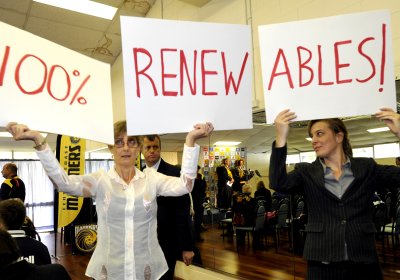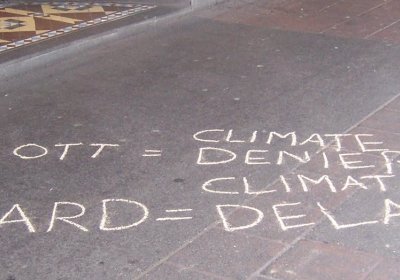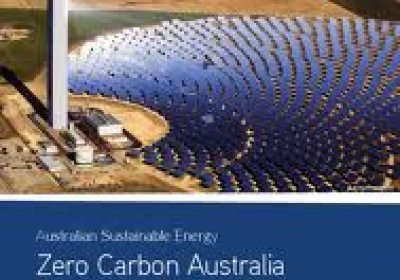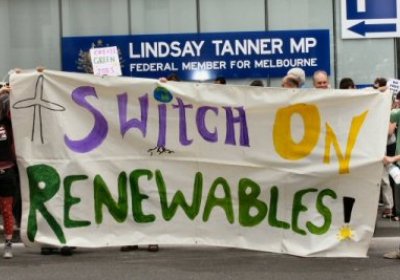In Australia, the question of environmental protection has increasingly been linked to the need to reduce or contain the nation’s population level size. This is often tied to the argument that the high level of consumption in First World countries is unsustainable.
Climate change
By August 12, more than 20 million people had been affected by the floods in Pakistan. Waters remained at dangerous levels in several parts of the country, with more torrential rains forecast by the weather department.
This has been one of the most devastating floods in world history. The UN has once again appealed for donations for Pakistan. But the international response has been slow.
WYONG — Climate action activists confronted Prime Minister Julia Gillard on August 3 when she appeared at a soccer club in Wyong on the NSW Central Coast.
She was handed a statement from the local climate action group about transitioning as soon as possible from fossil fuels, to renewable energy and a copy of the Zero Carbon Australia plan by Beyond Zero Emissions.
Activists held placards that said: “Fund solutions not pollution” as Gillard was speaking. They then confronted Gillard as she left the soccer club.
In Russia, a seven-week-long heatwave has caused giant firestorms to break out across more than 114,000 hectares of the country. At least 48 people have died and more than 400 new fires broke out on August 4 alone, the Kyiv Post said that day.
Russian President Dmitri Medvedev said on July 30 that “practically everything is burning” in 14 regions of the country, Time said on August 2.
In the past, Medvedev has not seemed too concerned about climate change. At last year’s Copenhagen climate conference he bluntly announced that Russia would increase its emissions.
Dismayed by the Labor government’s inaction on climate change and looking for an alternative? Don’t look to the Liberals.
If the ALP has been dodgy on the issue, Tony Abbott’s party has been dodgier.
Sincere commitment on the issue is hard for Abbott. At a public meeting last September, he said global warming was “absolute crap”.
But the Liberal leader is remarkably consistent on one thing — the “need” to funnel large amounts of public money to big business.
VoteClimate.org.au has released a detailed description of the climate policies of parties contesting the August 21 federal election. It is the world’s first dedicated climate election website and is run by climate activist Adrian Whitehead, a founder of Beyond Zero Emissions and a Target300.org campaigner.
The site, which includes links to each partiy’s policies, ranked the policies as following:
The US emission trading scheme in sulphur dioxide (SO2) — the gas that causes acid rain — is widely held as proof that the market can cut pollution.
Pro-market commentators point to the success of this “acid rain market” as evidence that similar kinds of carbon trading schemes are the best way to tackle climate change.
New York Times columnist Paul Krugman said on April 11 the scheme showed “that it is generally best to rely on a market-based approach”.
But this poster child for emissions trading has now collapsed in a heap.
In the midst of a Federal Election and with the major party leaders equivocating on climate change and a price on carbon, the Zero Carbon Australia Stationary Energy Plan will be launched at a free public forum in Sydney Town Hall on Thursday 12 August at 6.00 pm.
Hosted by the journalist and broadcaster, Quentin Dempster, the speakers will include:
· Malcolm Turnbull, MP for Wentworth
· Bob Carr, former NSW State Premier
· Scott Ludlam, Greens Senator for WA
· Matthew Wright, Executive Director, Beyond Zero Emissions
· Allan Jones, Sustainability Expert, City of Sydney
This federal election both Labor and the Coalition have failed to present any serious policies to address climate change. The Greens on the other hand have a plan to cut emissions, but does it go far enough?
The Coalition’s Tony Abbott rose to the leadership with the backing of a hardcore group of climate denier MPs. His “direct action” policy on climate change has two big problems: it’s not direct and it’s not much action.
Food security will be a focus of November’s Climate Change/Social Change conference, being held in Melbourne. An entire workshop stream will be devoted to the topic.
The global food system captures the insanity of production for profit: One in six people in the world are malnourished, yet the United Nations estimates that 40-50% of all food in the United States is wasted.
Food waste makes up to half of Australian landfills.
The “world’s first dedicated climate election website” Vote Climate, which rates political parties climate change policies, has recommended a vote for the Socialist Alliance in the upcoming August 21 federal elections.
Vote Climate provides detailed policy analysis based on available policy as the primary source, and public documents and public statements as a secondary source.
SA is ranked first as the only party that has “policies that might stop runaway climate change” and “adopt a climate emergency response”.
Two recent reports, released by NASA and the US National Climate Data Centre, have confirmed that last month was the warmest June since records began.
June was the fourth consecutive month that had broken temperature records, the US National Oceanic and Atmospheric Administration (NOAA) said. Global monthly records were also broken in March, April and May.
June was the 304th month in a row that recorded a global average temperature higher than the 20th century average. February 1985 was the last month temperatures fell below the average.
- Previous page
- Page 13
- Next page











